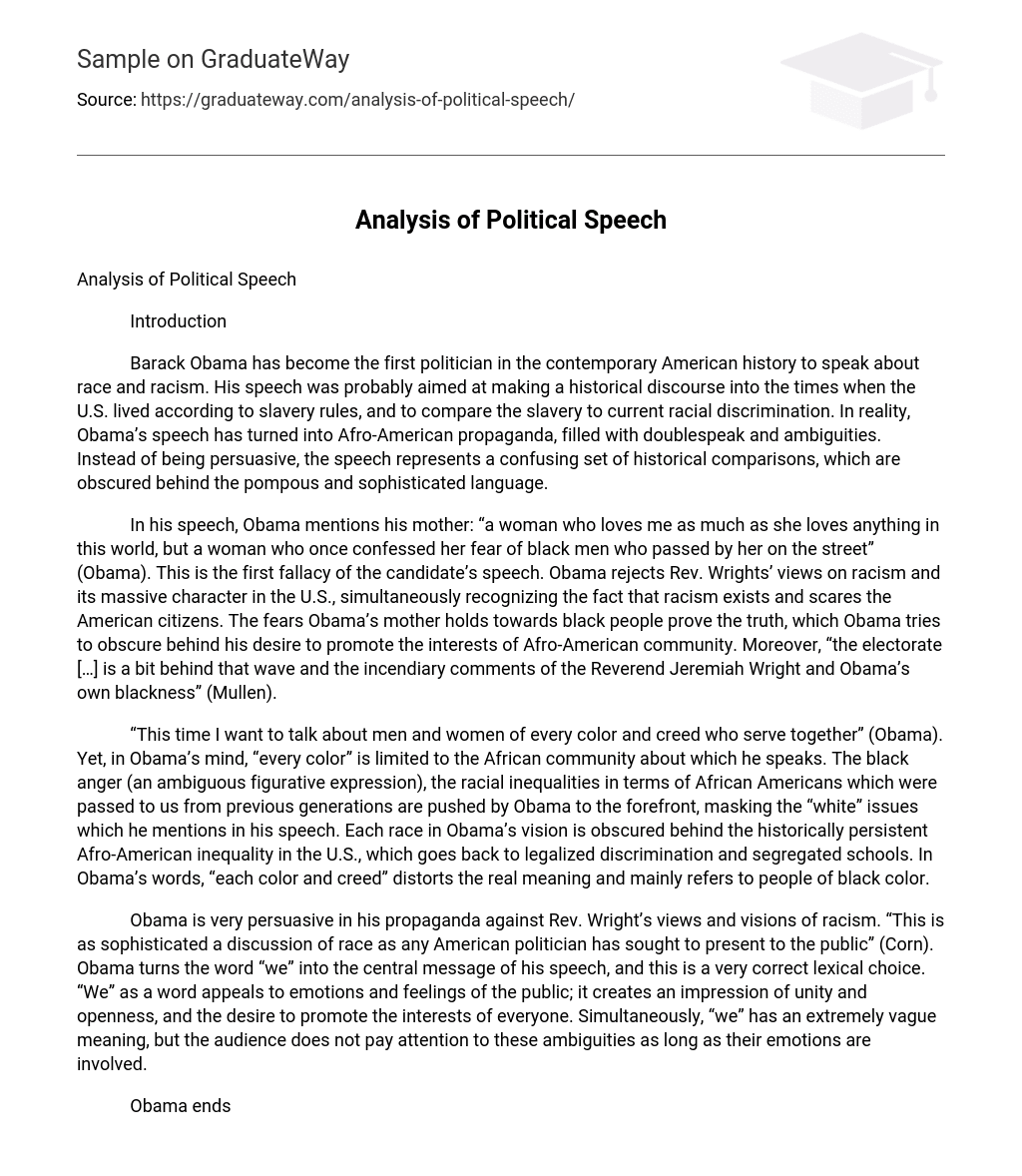Introduction
Barack Obama has become the first politician in the contemporary American history to speak about race and racism. His speech was probably aimed at making a historical discourse into the times when the U.S. lived according to slavery rules, and to compare the slavery to current racial discrimination. In reality, Obama’s speech has turned into Afro-American propaganda, filled with doublespeak and ambiguities. Instead of being persuasive, the speech represents a confusing set of historical comparisons, which are obscured behind the pompous and sophisticated language.
In his speech, Obama mentions his mother: “a woman who loves me as much as she loves anything in this world, but a woman who once confessed her fear of black men who passed by her on the street” (Obama). This is the first fallacy of the candidate’s speech. Obama rejects Rev. Wrights’ views on racism and its massive character in the U.S., simultaneously recognizing the fact that racism exists and scares the American citizens. The fears Obama’s mother holds towards black people prove the truth, which Obama tries to obscure behind his desire to promote the interests of Afro-American community. Moreover, “the electorate […] is a bit behind that wave and the incendiary comments of the Reverend Jeremiah Wright and Obama’s own blackness” (Mullen).
“This time I want to talk about men and women of every color and creed who serve together” (Obama). Yet, in Obama’s mind, “every color” is limited to the African community about which he speaks. The black anger (an ambiguous figurative expression), the racial inequalities in terms of African Americans which were passed to us from previous generations are pushed by Obama to the forefront, masking the “white” issues which he mentions in his speech. Each race in Obama’s vision is obscured behind the historically persistent Afro-American inequality in the U.S., which goes back to legalized discrimination and segregated schools. In Obama’s words, “each color and creed” distorts the real meaning and mainly refers to people of black color.
Obama is very persuasive in his propaganda against Rev. Wright’s views and visions of racism. “This is as sophisticated a discussion of race as any American politician has sought to present to the public” (Corn). Obama turns the word “we” into the central message of his speech, and this is a very correct lexical choice. “We” as a word appeals to emotions and feelings of the public; it creates an impression of unity and openness, and the desire to promote the interests of everyone. Simultaneously, “we” has an extremely vague meaning, but the audience does not pay attention to these ambiguities as long as their emotions are involved.
Obama ends his speech in a confusing tone. First, he implies that racism is less important than class and economic division of power. Second, the bottom line of his message states “this is where we are right now. It’s a racial stalemate we’ve been stuck in for years” (Obama). If Rev. Wright is wrong in his vision of racism in the American society, what racial stalemate does Obama mean? If we’ve been stuck in it for years, why doesn’t Obama offer a plan for resolving these social issues? Evidently, the candidate has failed to choose a proper concluding sentence for his speech. This is why Sen. Obama’s speech leaves mixed impressions and does not offer any solution to the problems of racism in the U.S.
Conclusion
Obama’s speech produces a very confusing impression. The language is sophisticated. Objective lexical meaning is often replaced by doublespeak. Obama was creating the speech to reach the minds of his voters and to persuade them that he would be able to unite the nation, but he has offered any possible means of eliminating racism. This is why Obama’s speech remains an example of distorting approaches to propaganda and emotional appeal.
Works Cited
Corn, D. “Politics Unusual: Obama Abandons Blame Game in Sophisticated Discussion of
Race.” 2008. Election 2008. 28 April 2008. http://www.alternet.org/election08/80135/?page=3
Mullen, S. “Obama: Race, God & More Perfect Union.” 2008. The Moderate Voice. 28 April
2008. http://themoderatevoice.com/at-tmv/newsweek-blogitics/18453/obama-race-god-a-more-perfect-union/
Obama. B. “A More Perfect Union.” 18 March 2008. Obama’08. 28 April 2008.
http://my.barackobama.com/page/content/hisownwords





